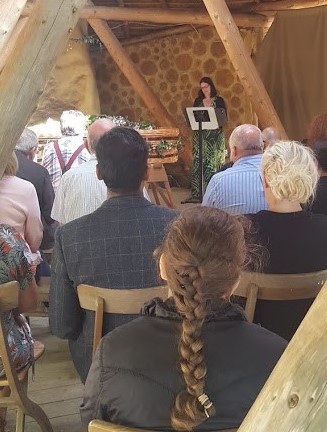Death is a largely taboo subject for us in the UK, yet it is part of life and will happen to us all. Most of us have already experienced bereavement before we become adults; the death of a grandparent or a much loved family pet is a common experience for many young children. Ultimately death is the one experience every single person on Earth is guaranteed to share. Yet still we don’t talk about it. But, there are many benefits to talking about your funeral and end of life wishes, and considering funeral planning – which doesn’t necessarily mean paying for your funeral.
A 2014 survey carried out by Dying Matters showed that only around 20% of adults in the UK have discussed their funeral wishes with anyone and of those adults with a partner, less than half had discussed their wishes with their partner. Fear and superstition play a part in this: we’re scared to talk about death in case it brings it into our lives, we’re scared we’ll upset the person we’re talking to. But talking about death and funerals can have real benefits. Here’s why you should be having this conversation.
Who is a Funeral for?
A funeral is not just for the person who has died, it is an important rite of passage for the bereaved too. It’s a chance to gather together the community of those who loved, knew or will miss the person who has died, to support each other, to remember, and to say goodbye. A funeral service (whether a ‘traditional’ service or a more informal gathering of mourners) which does these things well, which feels ‘right’ for both the person who has died and their close friends and family, can significantly benefit the bereaved. Conversely, a funeral which doesn’t fulfil these needs can mean loved ones feel they haven’t had the chance to say goodbye in a way which is meaningful for them, and this can complicate grief. Your family will appreciate having some guidance on your funeral wishes so that they can honour and remember you in the way you want. It’s also helpful to leave your family some space to create their own tributes to you as well.
Decision making is difficult when we’re grieving
Arranging a funeral involves a lot of decision making, from key decisions such as whether the person is to be buried or cremated, where the service should be held, and whether to have a religious or non-religious service and what that service should include in terms of music, speakers or readings, to more minor decisions such as a choice of floral tributes, a charity for in memoriam donations, even what type of coffin to choose. Funeral services are becoming increasingly more personal and individual as a result of a much greater range of choices available and whilst this can result in a more fitting funeral, it’s also stressful for the bereaved to be making these decisions under pressure at the time when they are least able to do so: in the emotionally charged immediate aftermath of a death.
Why should I talk about my funeral?
Talking with those you are close to about your own funeral wishes or funeral planning in advance has several benefits:
- You have given guidance and removed uncertainty – when the time comes your family can be confident they are doing what you wanted rather than trying to guess
- You have taken away the pressure of your loved ones having to make big decisions when they’re emotional and grieving
- You have the chance to research options available and discuss what works for both you and those who matter to you – for example, some of your ideas may change if it’s clear after discussion that they’re not right for those you love
- You can consider putting in place financial arrangements to cover or contribute to the cost of your funeral (if you wish to do so) with a more accurate idea of what those costs might be – or change your wishes to fit a more realistic budget
- You will create a funeral which is right for you and those close to you – which in turn will help to deal with the effects of the bereavement
- It’s much easier to talk about death when there’s no immediate prospect of it happening as it’s far less emotional
So, go on, be brave. Start talking to those who are important to you about your funeral wishes and encourage others to talk about theirs with you.
Should I pay for my funeral in advance?
Funeral planning doesn’t necessarily mean paying for your funeral. You may wish to research costs and options as part of thinking about your funeral wishes but recording your wishes doesn’t have to involve buying a funeral plan. Instead, you may wish to simply put some money aside in a separate savings account and let your family know that it’s there for them at the time of need. If you do decide to buy a funeral plan, you should do your homework. A paid funeral plan is an investment and decisions about buying a funeral plan should be made as carefully as you would make any other investment decisions.

Where can I find out more?
If you’d like some help to think about your funeral wishes or advice on funeral planning, see further advice here or contact me

